Trans Women Don’t Want Your Sympathy. They Want to Be Treated as Human Beings.
This year, at Pride, let's work to end the epidemic of murdered Black trans women.
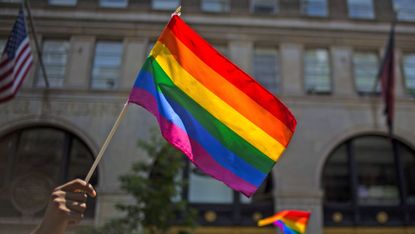
It’s Pride month—a celebration of the legacy of resistance that people who are lesbian, gay, bisexual, transgender, gender non-conforming, and more have waged to live their lives on their own terms. Fifty years ago this month, the now-famous uprising at the Stonewall Inn in New York City marked a turning point for people who were forced to live in the shadows because of their sexuality or for choosing to defy gender norms.
As a Black queer woman who has been married to a trans person for more than 10 years, I’m conflicted about what Pride has become. While rainbow flags decorate nearly everything from my Uber ride to streetlights, more than 10 trans women, the majority of them Black, have been murdered this year—seven have been murdered in the past month.
More than 10 trans women, the majority of them Black, have been murdered this year.
Dana Martin was 31 when she was killed in Montgomery, Alabama. Jazzaline Ware was found dead in her apartment in Memphis, Tennessee. Ashanti Carmon was 27 when she was shot and killed in Prince George’s County, Maryland. Claire Legato was 21 when she was shot and killed in Cleveland, Ohio. Muhlaysia Booker was shot and killed in Dallas, Texas; she was 23. Paris Cameron was one of three people who were shot and killed in an anti LGBT hate crime in Detroit, Michigan. Chynal Lindsay was 26 when she was found dead in Dallas, Texas. Chanel Scurlock was 23 when she was found fatally shot in Lumberton, North Carolina. Zoe Spears was the same age when she was found lying in the street with signs of trauma in Fairmount Heights, Maryland. Each one of these women are Black.
The average life expectancy of a Black trans woman in America is 35 years old. None of these women had even reached that young age. The difference between the average life expectancy of a Black trans woman and the rest of the population is striking: The average life expectancy of Black cisgender women is 78 years old—more than 40 years longer than Black trans women. All but two of the Black trans women who were murdered this year, didn’t even make it to age 30. This fact alone should be sending us into a frenzy, during Pride month, no less—and yet, it’s not.
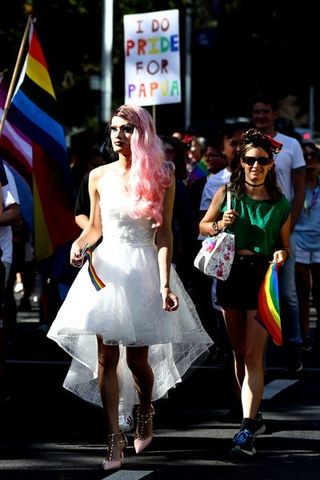
A Pride celebration in New Zealand
From Sylvia Rivera to Miss Major Griffin Gacy, trans women of color have opened doors for others in the community to live more freely. Yet few seem to want to interrupt the celebrations to take on a fundamental question facing not only the queer community but the whole of American society: Why are Black trans women being murdered?
Gender is a tricky terrain, littered with what we have all been taught about what a “man” is and what a “woman” is. Most of those characteristics are constructed by society and are rooted in power. Being assigned a woman or a man, through no choice of your own, has consequences. In America, being assigned a woman means being paid less and being more likely to be sexually assaulted or raped, among other things.
What is also tricky, and for many, dangerous, about being assigned a gender is that if you defy the gender you were assigned, you are more susceptible to being forced to live below the poverty line, to be unemployed or conditionally employed, to lack adequate healthcare, and to be murdered.
Stay In The Know
Get exclusive access to fashion and beauty trends, hot-off-the-press celebrity news, and more.
Exclusion, discrimination, poverty, and a lack of political power is what is killing trans women, and, particularly, trans women of color. Daring to define yourself, for yourself, is a fundamental value that this country espouses, and yet this community is not being afforded the promise that America claims to offer.
Isa Noyola is the Deputy Director at Mijente, a hub for organizing Latinx and Chicanx people online and offline. Noyola, who is a trans Latinx activist herself, works with members of her community to change the laws and the culture that keeps trans women on the outskirts of society, and has done so for the last decade. “The community has been in survival mode, and has been insular in trying to survive and keep living, in ways that are often clandestine. The large part of our community is engaged in street-based economies: sex work or other means of survival. We have had to take care of ourselves without relying on the state to protect us, and there’s resilience in that.”
Exclusion, discrimination, poverty, and a lack of political power is what is killing trans women.
Indeed, transgender communities have had to find ways to survive despite having few protections or safety nets. In the last two years, the Trump administration has rolled back nearly every protection passed under the previous administration, going so far as to permit discrimination geared towards those who refuse the gender they were assigned. To be honest, trans communities did not enjoy many protections in the first place. Transgender communities face discrimination in housing, employment, and education. And, without legal protections against these forms of discrimination, community members are forced to make a way out of no way.
The 2015 U.S. Transgender Survey reports that conditions facing Black transgender people are shocking, even in comparison to their Black cisgender counterparts. Twenty percent of respondents were unemployed, twice the rate among Black people in the U.S. population, and 38 percent of respondents were living in poverty, as compared to 24 percent of Black people generally. Thirty-four percent of respondents who saw a healthcare provider that year reported having at least one negative experience related to being transgender, including being refused treatment, being verbally harassed, being physically or sexually assaulted, or having to teach the provider about transgender people in order to receive appropriate care. Two-thirds of Black respondents said they would feel somewhat or very uncomfortable asking the police for help. The National Transgender Discrimination Survey reports that Black and Black multiracial respondents had the highest rate of sex trade participation (40 percent), followed by Latinx respondents (33 percent).

Janet Mock, a Black trans woman, recently made television history.
If the stories of Black trans women who are being murdered aren’t being told enough (which they aren’t), accounts of Black trans women fighting back are just as rare. Black trans women have shaped the fight for gender equality, are shattering ceilings, and are refusing to be defined solely by their circumstances. And their stories deserve to be told.
Marsha P. Johnson was 23 when she got involved in the uprising at the Stonewall Inn, at the same time that she was performing sex work in order to survive and managing challenges with her mental health. Aria Sa’id, Janetta Johnson, and Honey Mahogany founded the first transgender cultural district in San Francisco, California, commemorating the Compton Cafeteria Riots a full three years prior to the Stonewall uprising. Raquel Willis is the first Black transgender woman to lead OUT magazine, one of the nation’s premier magazines dedicated to the LGBT community. Janet Mock, director, writer, and producer of the hit television show Pose, just last week made history when she became the first Black trans woman to land a major deal with Netflix. These are just a few accomplishments by Black trans women that defy the circumstances they are forced to confront every day.
Black trans women are working to build power, to change the laws that leave them out, and to shift the culture that dehumanizes them. One of those changemakers is Andrea Jenkins, the first Black trans woman to be elected in the country, who represents Ward 8 on the Minneapolis City Council. “When we lift up the most marginalized people in our community, in our society, in our country, everybody benefits,” she says. Jenkins points to federal legislative solutions like the Equality Act that would add gender identity and sexual orientation to groups deserving of protection from discrimination in housing, employment, and healthcare. The bill passed the U.S. House of Representatives, but is unlikely to be considered in the Senate, due to opposition from Senate Majority leader Mitch McConnell from Kentucky.
Trans women don’t want your sympathy; they want to live dignified lives. For that to be a reality, trans women must have access to all of the things that we all need to live dignified lives, including employment free of criminalization, healthcare, housing, and education. Anything less than that is sentencing Black trans women to death.
MORE FROM ALICIA GARZA
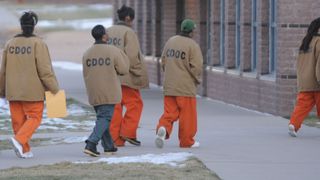

-
 Miley Cyrus Strips Down to Nothing But the Yeti Coat Trend
Miley Cyrus Strips Down to Nothing But the Yeti Coat TrendThe pop star teased her new album in a shaggy winter statement piece and no pants.
By Hanna Lustig Published
-
 The 32 Most Out-There Shoes to Ever Grace the Red Carpet
The 32 Most Out-There Shoes to Ever Grace the Red CarpetIncluding—of course—Lady Gaga's meat shoes.
By Amanda Mitchell Published
-
 Prince Andrew Backs Out of Another Holiday Event After "Damaging" Spy Scandal Forces Him to Spend Christmas Alone
Prince Andrew Backs Out of Another Holiday Event After "Damaging" Spy Scandal Forces Him to Spend Christmas Alone"The multiple scandals he has been associated with have embarrassed his family and made him a subject of ridicule."
By Kristin Contino Published
-
 36 Ways Women Still Aren't Equal to Men
36 Ways Women Still Aren't Equal to MenIt's just one of the many ways women still aren't equal to men.
By Brooke Knappenberger Last updated
-
 How New York's First Female Governor Plans to Fight for Women If Reelected
How New York's First Female Governor Plans to Fight for Women If ReelectedKathy Hochul twice came to power because men resigned amid sexual harassment scandals. Here, how she's leading differently.
By Emily Tisch Sussman Last updated
-
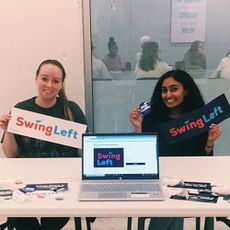 Why the 2022 Midterm Elections Are So Critical
Why the 2022 Midterm Elections Are So CriticalAs we blaze through a highly charged midterm election season, Swing Left Executive Director Yasmin Radjy highlights rising stars who are fighting for women’s rights.
By Tanya Benedicto Klich Published
-
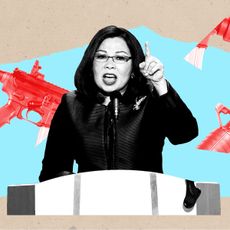 Tammy Duckworth: 'I’m Mad as Hell' About the Lack of Federal Action on Gun Safety
Tammy Duckworth: 'I’m Mad as Hell' About the Lack of Federal Action on Gun SafetyThe Illinois Senator won't let the memory of the Highland Park shooting just fade away.
By Sen. Tammy Duckworth Published
-
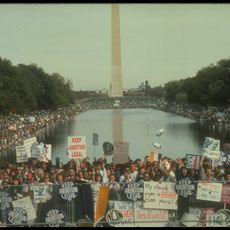 Roe Is Gone. We Have to Keep Fighting.
Roe Is Gone. We Have to Keep Fighting.Democracy always offers a path forward even when we feel thrust into the past.
By Beth Silvers and Sarah Stewart Holland, hosts of Pantsuit Politics Podcast Published
-
 The Supreme Court's Mississippi Abortion Rights Case: What to Know
The Supreme Court's Mississippi Abortion Rights Case: What to KnowThe case could threaten Roe v. Wade.
By Megan DiTrolio Published
-
 Sex Trafficking Victims Are Being Punished. A New Law Could Change That.
Sex Trafficking Victims Are Being Punished. A New Law Could Change That.Victims of sexual abuse are quietly criminalized. Sara's Law protects kids that fight back.
By Dr. Devin J. Buckley and Erin Regan Published
-
 My Family and I Live in Navajo Nation. We Don't Have Access to Clean Running Water
My Family and I Live in Navajo Nation. We Don't Have Access to Clean Running Water"They say that the United States is one of the wealthiest countries in the world. Why are citizens still living with no access to clean water?"
By Amanda L. As Told To Rachel Epstein Published